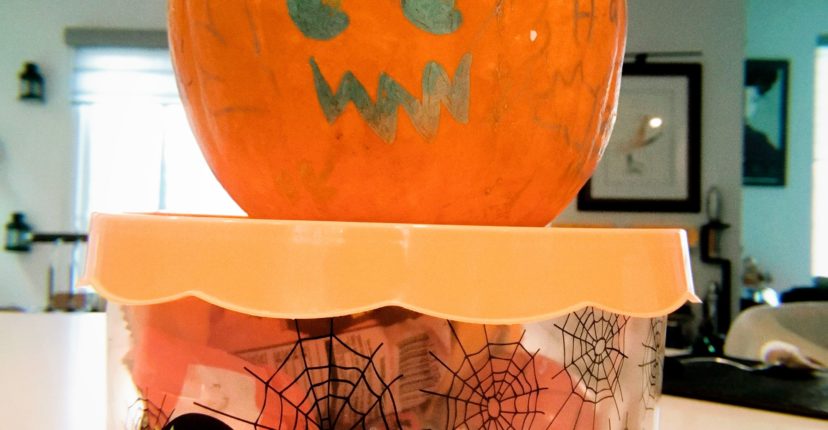Halloween candy seems to be worse than zombies and night creatures. Maybe we as parents need to adjust our reactions about making a big deal about sweets.
This year, Mini wants to dress up as a huntress. Don’t ask me why, but it’s clear she is very interested in make clear to everyone she is a tough cookie. And speaking of cookies, I have discovered an interesting behavior regarding Halloween candies.
In my experience…
It all started when I discovered, during the summertime, she had a goodie bag filled with candies in her nightstand drawer.
I was less than excited when I found it out because we deal with ant invasions on a regular basis, and it is obvious they can find the sugary things even if they are inside a bag in a drawer, but also because I hate when I feel my daughter is lying to me.
Although I felt tested in my patience (she knows food items are not allowed anywhere else but the kitchen area) and a bit cheated, I calmly explained her the ant situation and how much I wanted them to stay away from her bedroom.
We agreed she could have access to the candies if she wanted to, but I put the bag in a public area, where anyone can go grab some sweets.
Guess what happened? For a week or two, she regularly grabbed a piece of candy, without me saying a thing. After that, she started to forget about it and now, I am about to toss that freaking bag because she really can’t remember it is there, although it is in plain sight.
«Guess what happened?
I am about to toss the freaking bag full of candy
because she already forgot it»
The next thing that happened was she wanted to get Halloween candy to give away for trick-or-treating with her friends and neighbors. I was resistant to buying it because I felt we definitely didn’t need to buy more sugary things. But I ended up giving up and got the bag: she would only take a couple of them and the rest is for trick-or-treaters and friends.
I soon realized it was a mistake. The closed candy bag seemed to have a magnetic attraction for Mini. She would stare at it, explore the available options through the transparent plastic windows and whine a bit about her really wanted candy. She said I need to keep the bag hidden so she would not be tempted.
One morning, I remembered what happened with the goodie bag and I decided to take a risk. She would not stop whining about craving candies. I told her she could open the candy bag, grab one piece of candy and save the rest for Halloween night. Again, guess what happened? She grabbed her mini Kit-Kat, ate it as it was the most precious thing she could ever have… And after a couple of days, she forgot the bag was there, completely available for her at the kitchen counter.
Our best intentions as parents can backfire to us (great! 🤦🏻♀️🤦🏻♀️)
As a parent, it is completely normal to freak out from the idea of having our kid or kids on a 4-day sugar rush cycle. That thought only is powerful enough for us to try to ration their Halloween treasured candies in any possible way. But here is a thing: Research shows that confiscating sweets and candy can backfire and mess up a person’s relationship not only with desserts and sugary goods but with food in general. And this applies not only to kids but to adults as well. Just remember how desirable that big candy bag looked for Mini and how quickly she forgot about it once she didn’t feel constrained.

Parental bites you might find useful
- Don’t make a big deal of Halloween treats. Don’t use moral adjectives to describe them -such as «good» or «bad», or «junky» and «unhealthy». Use the name brands if needed. The idea is to help them (and you) not to promote a connection between a type of food and shame or guilt feelings. Not now, not ever. These kinds of emotional connections with some foods promote food anxiety and pressure that can lead to binge- eating and a non-intuitive relationship with good.
- Draw their attention to all the other things surrounding this holiday. The more attention you give to other enjoyable parts of the experience, the more it will become a «more-than-candy» day/night or season. The decorations, other people’s costumes, haunted houses, and pranks are the perfect way to release possible sugary food anxiety.
- Have sweets and candy available all year round. If the kids are only able to have them on very special occasions that only happen once or twice a year, the feeling of deprivation of that type of food will kick in hard. The impulse of eating candy ‘till drop dead is the expected reaction to deprivation.
- Habituation seems to be a better practice. This means you help a certain type of food lose its novelty by being exposed to it on a regular basis. This way, the cravings for it go down, as you don’t feel you need permission to eat it.
- Also, little by little, throw away candies «guerilla style». Without the kids noticing the candies are going away, of course. That means keep candy available all year round, but not in immense quantities. There is always someone who has a sweeter tooth.
Last night she gave away some of the candies from the big bag to her basketball teammates, who were extremely happy with it. And tonight we will go door-to-door to get her more candies than she can -or even care to eat.








Facebook Comments